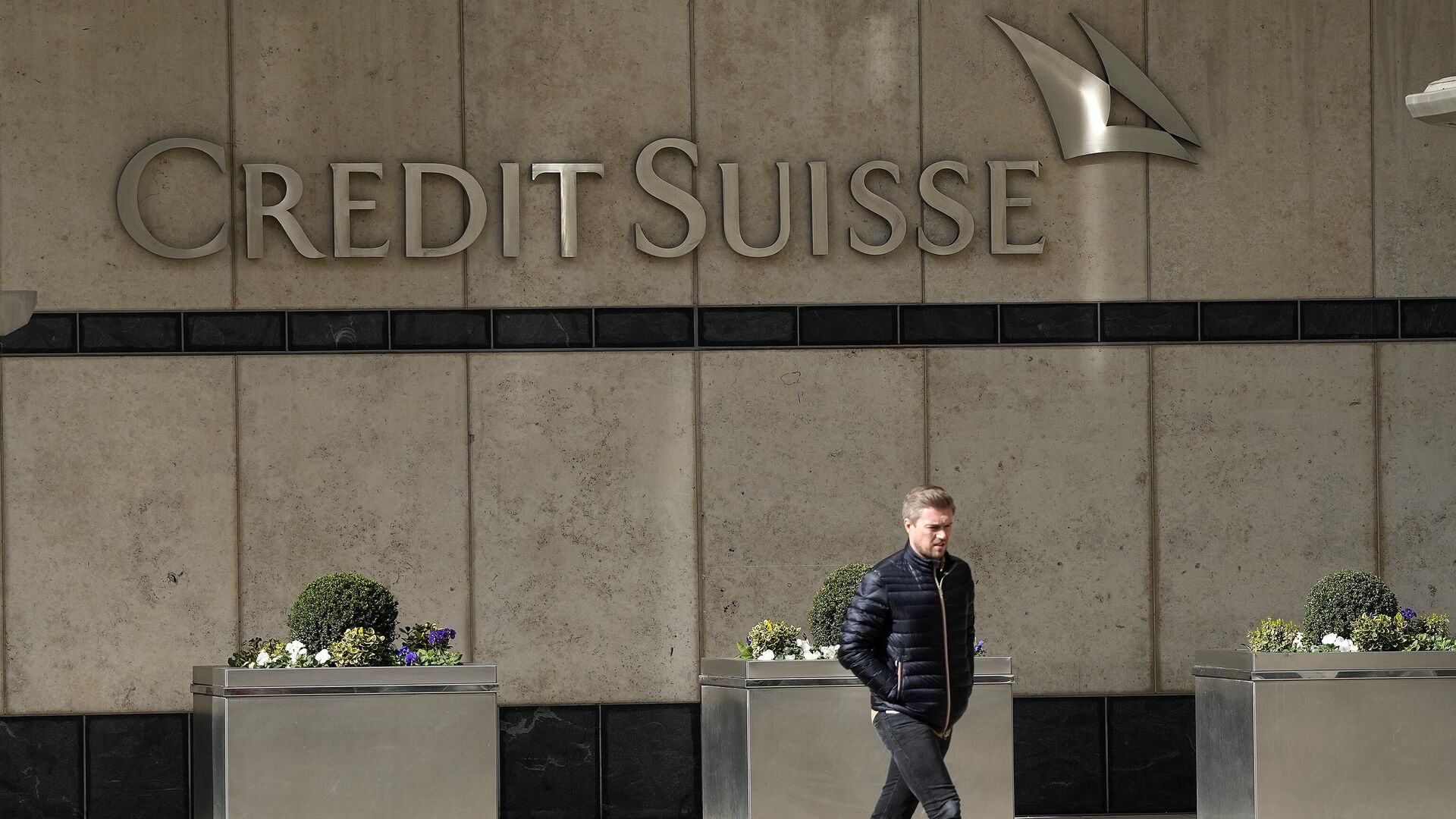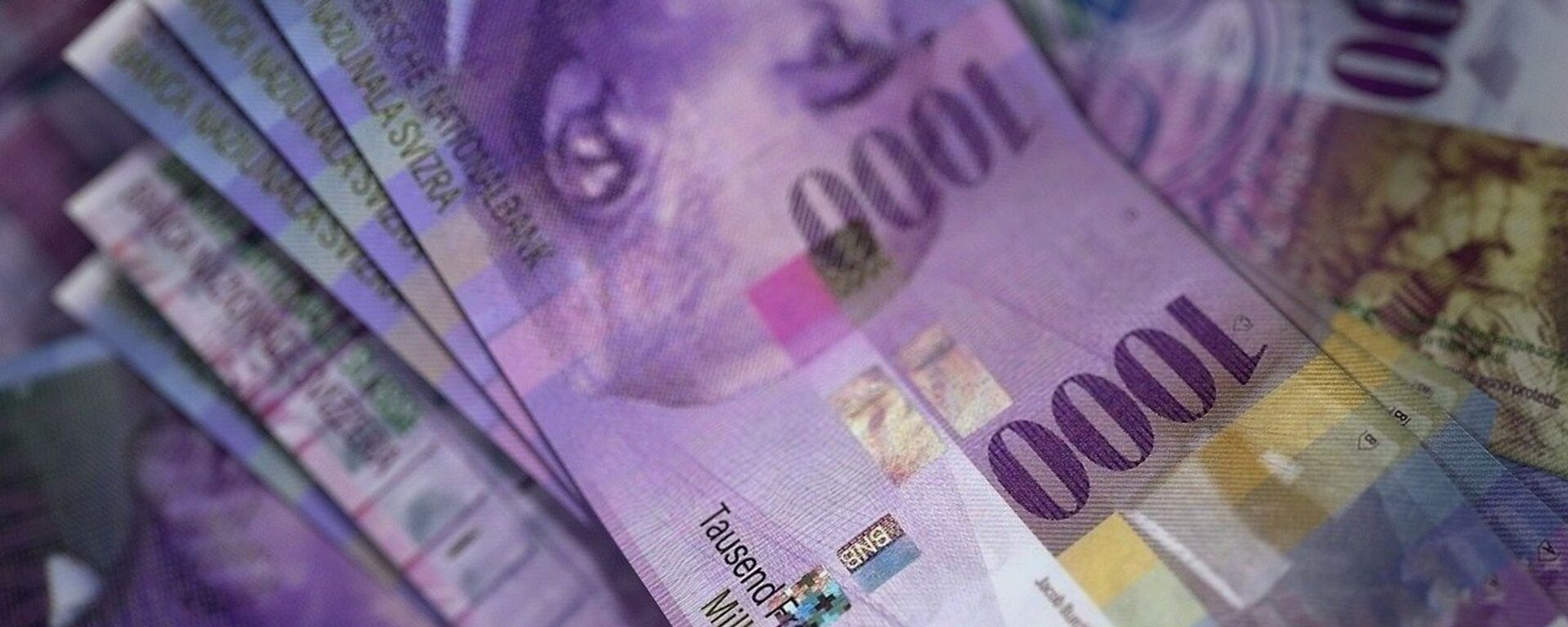https://sputnikglobe.com/20230316/silicon-valley-bank-was-canary-in-the-coal-mine-of-deepening-finance-crisis-1108452689.html
Silicon Valley Bank Was 'Canary in the Coal Mine' of Deepening Finance Crisis
Silicon Valley Bank Was 'Canary in the Coal Mine' of Deepening Finance Crisis
Sputnik International
The sudden share price slump at Switzerland's biggest private bank has shocked the global financial markets. Investigative journalist Dan Lazare argues that was heralded by last week's collapse of Silicon Valley Bank.
2023-03-16T13:35+0000
2023-03-16T13:35+0000
2023-03-16T13:36+0000
us
switzerland
credit suisse group ag
silicon valley bank collapse
silicon valley bank
dan lazare
economy
financial crisis
https://cdn1.img.sputnikglobe.com/img/07e7/03/10/1108465482_0:0:3073:1728_1920x0_80_0_0_748900ca0b5d7aa743987dd110d4d715.jpg
The collapse of the US Silicon Valley Bank (SVB) was just the start of a new global financial crisis, pundits have said.Stocks in 167-year-old Swiss banking giant Credit Suisse tumbled on the market on Wednesday.The bank's share price recovered rapidly on Thursday morning after the Swiss National Bank, three-quarters owned by state bodies, announced it would provide a credit lifeline of up to 50 billion francs ($54 billion).The major market tremor increased fears that a banking crisis on the level of the 2008 'Credit Crunch' was looming.Dan Lazare told Sputnik that SVB was just the proverbial "canary in the coal mine."The journalist noted that Credit Suisse, with total assets of more than $500 billion, was "truly too big to fail" as it is a "major prop of the of the public financial system."The SVB collapse has been blamed on the US Federal Reserve hiking interest rates in an attempt to control record inflation — itself driven by the US Treasury's sanctions on Russia over its de-military operation in Ukraine.He pointed out that the Fed's traditional response to market crashes has been to "turn on the liquidity firehose" and lend money liberally."But this time, the Fed can't do that because it has this inflation problem. So what will the Fed do? Its traditional medicine is no longer available," Lazare emphasises "This crisis is going to get very big. And this time there is no clear way out."Lending Money They Don't HaveTodd "Bubba" Horwitz, Chief Market Strategist of BubbaTrading.com, told Sputnik that both regional and national banks are heavily "overleveraged.""They're actually actually lending out much more than 10 to 1," which is "money they don't have," Horwitz explains.The banks make a fortune "as long as the markets go in a direction that is beneficial to them," but The minute things start to change or we suddenly see they become overleveraged and they don't have enough assets to cover withdrawals."The market pundit criticised moves by US president Joe Biden's administration and the Swiss National Bank to bail out the failing institutions — just as governments did during the 2008 'Credit Crunch'.
https://sputnikglobe.com/20230316/credit-suisse-crisis-may-trigger-domino-effect-and-eventual-capital-flight-from-europe-1108460475.html
switzerland
Sputnik International
feedback@sputniknews.com
+74956456601
MIA „Rossiya Segodnya“
2023
James Tweedie
https://cdn1.img.sputnikglobe.com/img/07e4/08/1c/1080307270_0:3:397:400_100x100_80_0_0_7777393b9b18802f2e3c5eaa9cbcc612.png
James Tweedie
https://cdn1.img.sputnikglobe.com/img/07e4/08/1c/1080307270_0:3:397:400_100x100_80_0_0_7777393b9b18802f2e3c5eaa9cbcc612.png
News
en_EN
Sputnik International
feedback@sputniknews.com
+74956456601
MIA „Rossiya Segodnya“
Sputnik International
feedback@sputniknews.com
+74956456601
MIA „Rossiya Segodnya“
James Tweedie
https://cdn1.img.sputnikglobe.com/img/07e4/08/1c/1080307270_0:3:397:400_100x100_80_0_0_7777393b9b18802f2e3c5eaa9cbcc612.png
switzerland, finance, credit suisse, silicon valley bank, dan lazare
switzerland, finance, credit suisse, silicon valley bank, dan lazare
Silicon Valley Bank Was 'Canary in the Coal Mine' of Deepening Finance Crisis
13:35 GMT 16.03.2023 (Updated: 13:36 GMT 16.03.2023) The sudden share price slump at Switzerland's biggest private bank has sent shockwaves through the global financial markets. Investigative journalist Dan Lazare, author of America's Undeclared War, argues that the crash was heralded by last week's collapse of the US Silicon Valley Bank.
The collapse of the US Silicon Valley Bank (SVB) was just the start of a new global financial crisis, pundits have said.
Stocks in 167-year-old Swiss banking giant
Credit Suisse tumbled on the market on Wednesday.
The bank's share price recovered rapidly on Thursday morning after the Swiss National Bank, three-quarters owned by state bodies, announced it would provide a credit lifeline of up to 50 billion francs ($54 billion).
The major market tremor increased fears that a banking crisis on the level of the 2008 'Credit Crunch' was looming.
Dan Lazare
told Sputnik that SVB was just the proverbial "canary in the coal mine."
"What's happened the last 24 hours is extraordinary. The the instability in the U.S. financial sector has spread to Europe," Lazare stressed. "The world is now in the throes of deep turmoil and and the don't knows where it'll end up at."
The journalist noted that Credit Suisse, with total assets of more than $500 billion, was "truly too big to fail" as it is a "major prop of the of the public financial system."
"There is a big storm heading our way," Lazare warned. "And clearly tightening up credit to fight inflation is a major factor driving this storm."
The SVB collapse has been blamed on the US Federal Reserve hiking interest rates in an attempt to control record inflation — itself driven by the US Treasury's sanctions on Russia over its de-military operation in Ukraine.
He pointed out that the Fed's traditional response to market crashes has been to "turn on the liquidity firehose" and lend money liberally.
"But this time, the Fed can't do that because it has this inflation problem. So what will the Fed do? Its traditional medicine is no longer available," Lazare emphasises "This crisis is going to get very big. And this time there is no clear way out."
Lending Money They Don't Have
Todd "Bubba" Horwitz, Chief Market Strategist of BubbaTrading.com,
told Sputnik that both regional and national banks are heavily "overleveraged."
"This fractional banking which we we use in this country as lending power of 10 to 1 is actually phony," he said. "The banks borrow money from the Federal Reserve," but "they can take that money they borrow and they can turn a liability into an asset through special accounting."
"They're actually actually lending out much more than 10 to 1," which is "money they don't have," Horwitz explains.
The banks make a fortune "as long as the markets go in a direction that is beneficial to them," but The minute things start to change or we suddenly see they become overleveraged and they don't have enough assets to cover withdrawals."
The market pundit criticised moves by US president Joe Biden's administration and the Swiss National Bank to bail out the failing institutions — just as governments did during the 2008 'Credit Crunch'.
"It is my hope that we don't bail them out again, because I don't see the point of bailing out a failing business," Horwitz said. "If the banks don't have enough money, bail out the depositors and let the banks go out of business and let new management come in."




